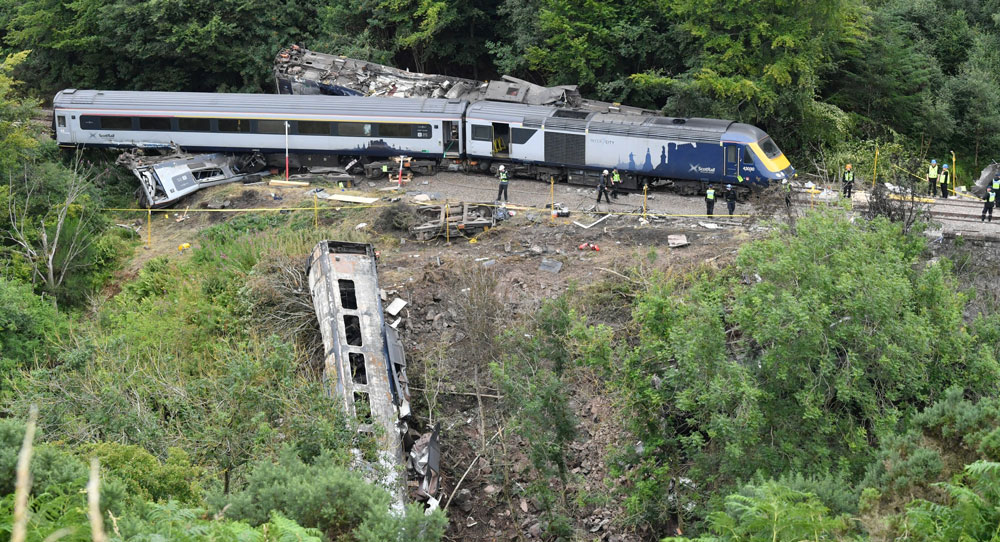The biggest issues of the month explored | Rail
Inside Track
RAIL
Stonehaven victims get £1M compensation
Network Rail also fined £6.7M for failures leading to fatal train crash
By Thomas Johnson
Network Rail has agreed to pay £1M in compensation to the victims of the Stonehaven train crash in 2020 that claimed three lives.
Driver Brett McCullough, 45, conductor Donald Dinnie, 58, and passenger Christopher Stuchbury, 62, died and six others were injured when a passenger train derailed at Carmont near Stonehaven in Aberdeenshire on 12 August 2020.
The incident occurred after heavy rain when the train hit a landslide. This was found to have been triggered by water overflowing from an inadequate drainage system installed for the track operator.
 Network Rail has agreed to pay £1M to victims of the crash
Network Rail has agreed to pay £1M to victims of the crash
In September Network Rail was fined £6.7M at Aberdeen High Court after pleading guilty to charges relating to its part in failures that led to the derailment. During the hearing, Network Rail admitted that it had failed to tell the driver to slow the train down in the Carmont area. The court heard that the driver had asked the Carmont area signaller if there were speed restrictions in place due to the weather, but was told that “everything’s fine.”
Network Rail agreed to pay £1M in damages to the victims in an out-of-court settlement, lawyers for Digby Brown said. The firm represented seven people who were affected by the Stonehaven crash.
A Digby Brown spokesperson said: “I can confirm our civil actions against Network Rail have all successfully settled. Specifics cannot be discussed – however, the total sum recovered was approximately £1M with all damages rightly reflecting the injuries, trauma and losses each person suffered and will continue to suffer for the rest of their lives.
“No amount of compensation will ever heal the wounds of the horrendous and avoidable tragedy at Carmont, but it can at least provide recognition to those affected and the means to look to the future in the most life-affirming way possible.”
Network Rail said: “To the families of those who lost their lives we would say again how deeply sorry we are that this tragedy was able to happen. And to those survivors who were injured, we are very sorry for the pain and distress caused. We’ve been working closely with victims and relatives since the tragic derailment at Carmont, which has included efforts to address compensation claims.”
In March 2022, the Rail Accident Investigation Branch (RAIB) report on the incident said that it had occurred due to incorrectly installed and maintained drainage in the area.
The botched drainage construction, which had been undertaken by now-defunct contractor Carillion, was the underlying cause of the crash, says the RAIB report into the derailment, published in March 2022.
It says a trench containing a perforated pipe, constructed by Carillion between 2011 and 2012 was the focus of the enquiry. The pipe was installed as part of a project to address a known problem with drainage and embankment stability at the site.
But the drainage system and associated earthworks had not been constructed in accordance with the original design and the RAIB concluded they were unfit to safely accommodate water flows on the morning of the derailment.
In addition, the RAIB found that while the work had been carried out by Carillion on behalf of Network Rail, the track operator had not properly overseen or inspected it. It concluded that when the period of heavy rainfall preceding the incident occurred, overflows caused by the inadequate drainage system caused a landslide which spilled onto the track. The train hit it at 117km/h, causing the derailment.